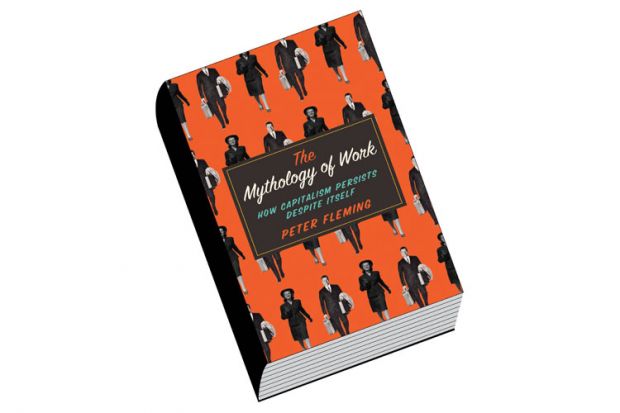Peter Fleming is angry, and rightly so. His rancour against bankers, construction firms and capitalism itself is impudent and undisguised. But these are common foes, universal symbols of enmity with which we have become familiar in our ongoing condition of crisis and austerity. Less conventional, in general parlance, is anger about “work” itself. Not just the elements or conditions of this or that job, but the institution in and of itself. In this indignant polemic, Fleming demolishes the myth of the work ethic that has kept us toiling harder and longer despite downward-spiralling wages, exhaustion and anomie. He takes apart our prima facie knowledge that “busy” is good, productivity is virtuous, and we are the strivers, not the skivers.
In highlighting the rising paranoia and anxiety we feel about being left behind at work, the lack of security that accompanies it and the waves of suicide from Threadneedle Street to the factories of Foxconn, Fleming connects many of the dots about work that many of us feel as palpable, but which we cannot quite articulate. His acerbic, darkly humorous prose makes for an entertaining read, perhaps for academics most of all. The long hours, “busy” culture, overwork, the kowtowing to (and sometimes enthusiastic endorsement of) management edicts even by self-proclaimed “critical” researchers make academics the subjects of this book par excellence.
It hardly bears repeating that we are all overworked. What does merit comment is our active collusion. We should, as scholars and researchers, read this book not only as therapy but also as a call to arms. It is a wake-up call for a reassessment of our work culture, personal attitudes to work and the competitiveness we have cultivated as we look over our shoulders at our colleagues’ latest monograph and scrabble for non-existent grant money. It calls for a re-examination of ourselves as contradictorily entrepreneurial selves, condemning the research excellence framework while expressing joy over REF “success” on personal Twitter feeds.
We should welcome The Mythology of Work as part of the broader canon of writing on the refusal of work, including Kathi Weeks’ excellent The Problem with Work: Feminism, Marxism, Antiwork Politics, and Postwork Imaginaries (strangely not cited here), as an opportunity to generate a collective critical conversation about work and to begin, together, to refuse the intensification of our labour that stretches on without end.
However, absent here are the ways in which anti-work politics and post-work imaginaries are being taken up in the streets and among a wave of anti-austerity activism. Yet the book echoes the growing demands from social movements for a distribution of resources and labour not dependent on the institution of work as we know it. These movements instead call for a universal basic income; shared “commons” that enable an escape (or at the very least a partial one) from wage labour; and quite simply: “everything for everyone”.
Most acutely, this book’s message recalls a series of bright yellow posters that appeared across London in 2011. Emanating from the student occupations, in advance of the TUC March for the Alternative in which the alternative consisted of “jobs, growth and justice”, the posters simply read: “Jobs are shit, growth is shit, all I want is revenge.”
Kate Hardy is lecturer in work and employment relations, Leeds University Business School.
The Mythology of Work: How Capitalism Persists Despite Itself
By Peter Fleming
Pluto, 224pp, £54.00 and £16.00
ISBN 9780745334875 and 4868
Published 20 May 2015
POSTSCRIPT:
Print headline: Why do we all go along with it?
Register to continue
Why register?
- Registration is free and only takes a moment
- Once registered, you can read 3 articles a month
- Sign up for our newsletter
Subscribe
Or subscribe for unlimited access to:
- Unlimited access to news, views, insights & reviews
- Digital editions
- Digital access to THE’s university and college rankings analysis
Already registered or a current subscriber? Login




